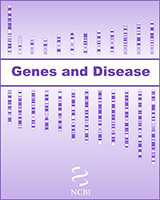NCBI Bookshelf. A service of the National Library of Medicine, National Institutes of Health.
National Center for Biotechnology Information (US). Genes and Disease [Internet]. Bethesda (MD): National Center for Biotechnology Information (US); 1998-.

The immune system is a complex and highly developed system, yet its mission is simple: to seek and kill invaders. If a person is born with a severely defective immune system, death from infection by a virus, bacterium, fungus or parasite will occur. In severe combined immunodeficiency, lack of an enzyme means that toxic waste builds up inside immune system cells, killing them and thus devastating the immune system. A lack of immune system cells is also the basis for DiGeorge syndrome: improper development of the thymus gland means that T cell production is diminished.
Most other immune disorders result from either an excessive immune response or an 'autoimmune attack'. Asthma, familial Mediterranean fever and Crohn's disease (inflammatory bowel disease) all result from an over-reaction of the immune system, while autoimmune polyglandular syndrome and some facets of diabetes are due to the immune system attacking 'self' cells and molecules. A key part of the immune system's role is to differentiate between invaders and the body's own cells - when it fails to make this distinction, a reaction against 'self' cells and molecules causes autoimmune disease.
- A child that recieved the measles vaccination will be protected from measles for life? That's because our immune cells have "memory"...
- Diseases of the Immune System - Genes and DiseaseDiseases of the Immune System - Genes and Disease
Your browsing activity is empty.
Activity recording is turned off.
See more...
